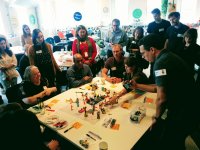Predictiv is a web platform that enables governments to test whether new policies and interventions work with an online population before they are deployed in the real world. The tests take 1 to 2 weeks to complete, enabling policymakers and Ministers to get answers to questions that would have taken months (or years) to answer in the past.
Innovation Tag: Experimentation
The Global Innovation Policy Accelerator is a UK government-funded development programme building a worldwide network of collaborative senior innovation policy ‘entrepreneurs’, introducing the latest thinking through practical projects, and using international collaboration to accelerate system-wide change. It is delivered by a ‘best of UK system’ consortium of UK organisation in 14 countries.
The Better Government Movement (BGM), housed on Innovation.gov, builds a 21st century, delivery-driven government. BGM creates an inclusive space where public servants can grow their creative capacity and learn new tools, approaches, and mindsets to jumpstart innovation. This is in service of solving government-wide problems and affecting positive change within agencies and government writ large.
CivTech is the Scottish Government’s challenge programme for innovation. The programme pioneers a smarter, faster approach to public procurement to harness entrepreneurial tech innovation and citizen engagement, improving public service delivery, creating economic development opportunities and fostering an entrepreneurial mindset within government.
A collaboration between government and community, Systemic Design eXchange (SDX) is an Edmonton-based community of practice for people interested in learning about systemic design as a methodology for addressing complex, real world issues. Together, we explore systems thinking, design thinking, and change lab approaches. With a bias towards learning by doing, SDX aims to be a watering hole where multiple sectors can come together, learn together, and act together.
The Asker Welfare Lab is a lab guided by the principle: "No decision about me, shall be taken without me."
Asker Welfare Lab is a concept for service delivery, solely centered on the citizen, in which all relevant municipal services, together with external partners of collaboration, invest together, aiming to raise the living standards, thereby bettering the quality of life of each individual and family in the program. All the services do still have one common factor - the citizen. Their…
The Data Science Accelerator is a capability-building programme which gives analysts from across the UK public sector the opportunity to develop their data science skills. Aspiring data scientists work on a project of real business value, supported by an experienced mentor. Graduates of the programme take their new-found skills back to their respective organisations.
FÉILTE (Festival of Education in Learning and Teaching Excellence) was developed because teachers are innovating and wish to share their learning. But teaching has been an isolated profession. Research indicates that we are not good at sharing learning across the public sector.
FÉILTE is a celebration of teaching and learning by teachers for teachers, students and parents. FÉILTE shares teaching so as to connect learning.
As part of the strategy about bringing schools into the digital era, 72 middle schools (pupils from age 11 to 15 years) have been selected to receive support for integrating digital technology into their teaching and the school administration. These 72 pilot “collèges connectés” are meant to be innovation and change leaders.
Seoul Metropolitan Government (SMG) announced the as a measure to enhance the city’s age readiness by supporting the younger elderly. The plan is one of the SMG’s social innovation model that has transformed towards the convergence of public policies to utilize the 50+generation as a meaningful social capital to cope with the city’s aging issues.



